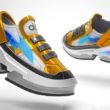NFT technology has opened up new ways of playing trading card games and collecting comics. In the case of gaming and collectibles startup, InterPop, it has expanded its trading card game to include storytelling via its own comic universe, giving fans the ability to play a small part in the direction of the comics through fan governance.
InterPop is led by American comic book veteran Brian David-Marshall, who was a founding partner of Malibu Comics, a comic book publisher in the late 1980s and early 1990s. Malibu Comics has worked on IPs that have been adapted into films, such as the Men in Black franchise, starring Will Smith.
Not only does David-Marshall have a wealth of experience in the comic book industry, but he is also a fixture of the Magic: The Gathering community from his time working with the game’s publisher, Wizards of the Coast. He is now one of the premiere commentators and consultants for Magic: The Gathering. With both comic book and trading card game experiences under his belt, David-Marshall saw an opportunity for blockchains to unlock new ways for communities to coalesce around the games and stories they love.
Following the public beta release of InterPop’s trading card game, Emergents TCG, we speak to Brian David-Marshall to find out how NFTs and blockchain can enhance the digital experience for comic and trading card game collectors.
Please tell us about yourself and the story behind InterPop.
I have spent my entire professional career in either the comic book or gaming spaces and when I was talking about building a new digital trading card game, set in a superhero universe, I was introduced to the idea of doing it as a blockchain project. I was initially skeptical but as I spent some time reflecting on it — it just made sense.
I have always found my digital experiences to be underwhelming. I hate the idea of buying something I don’t own and that had really stopped me from enjoying a medium I love in a digital form. Same with so-called “free to play” trading card games. I hate spending money on them and having nothing to show for it. No ability to sell a card when it becomes more desirable due to metagame shifts and no ability to anticipate those shifts like so many physical card game players have come to expect from their gaming experience.
That is what led to us forming a company to create products and marketplaces that lets fans own these digital collectibles and have agency over them.
What piqued your interest in the NFT space and where did you first hear about it?
Like most folks, I heard about blockchain when Bitcoin first started to seep into public consciousness with stories about reporters buying a pizza and such but it was not until about 3 years ago that I heard the phrase “NFT” and it was such a welcome concept to me given my misgivings about buying things I don’t actually own.
Why did you decide to launch NFTs centred around comics as opposed to other NFT products?
To be fair our first product to start up was our trading card game, Emergents TCG, but building a truly great game takes a lot of time and play-testing. Once I started thinking about the tech, it was something I just wanted to expand to as many digital forms of media as possible. Comics are something I have in my blood and I was excited about making digital collectible comics and giving those collectibles utility through fan governance.
How is InterPop getting people interested in the storytelling of the comics it is producing?
We allow owners of comics set in our Emergents Superhero Universe to vote on various aspects of the comics that range from the cosmetic to the cosmic. Fans have chosen which sketch piece of art would be advanced to a finished drawing, have had a say in character design, chosen which branching of a narrative we would follow, and have even dictated which characters would live and die.
The Abyss was a character who appeared in our Emergents Presents anthology and fans voted for that character to return time and time again. Based on their support for the character we gave The Abyss his own title. We celebrated the launch by giving away an NFT comic collecting the anthology stories in a special issue for SxSW this year. Anyone who got that free NFT comic could then vote on which of the three villains, featured in the three stories, would return as the main antagonist in the ongoing title. Huge kudos to writer John Rozum for rolling with all the punches we threw his way as he was trying to start writing.
How will NFTs and digital trading cards capture the excitement of buying, selling, and trading cards in real life?
Real-world Magic, Pokémon, and YuGiOh players all have a long history of underwriting their hobbies through buying and selling cards as the metagames of tournament play change the desirability of cards sometimes on a weekly basis. In free-to-play digital versions of those games, there is a flattening of cards since you only buy them from the game. There is no supply and demand. All cards are basically fungible and the best card has no more value than the worst card.
What’s InterPop’s goal in the NFT space and business-wise?
Our goal is to provide a better way for people to experience their digital media. We want to be the first blockchain experience for the millions of consumers new to the space. NFTs can be an impenetrable world for people who are not deeply enmeshed in it and we want to simplify them.
What do you think about the current state of the NFT market? What kind of role is InterPop playing in it?
We are really looking to inject some excitement into the space with a great game, fantastic stories, and a user experience that is robust enough for blockchain devotees but not off-putting to new users unfamiliar with the space.
What can users look forward to from InterPop this year?
We are very excited to shine a light on our amazing game design team which includes Hall of Fame gamers, World Champions, and folks who have worked on some of the best games in the world. The game we have built is not one we have built to be the best blockchain game but one that is able to go toe to toe with classics like Hearthstone, Magic and Pokémon.
What are the most challenging aspects of your role at InterPop and how do you overcome these challenges?
There are a lot of misconceptions around NFTs and a lot of entrenched positions held by people who think there is something untoward about them. We need to be going out and talking to people, listening to their apprehensions and telling them why we have chosen to build on Tezos so we can mint responsibly, enjoy low transaction fees, and feel confident that we will remain futureproofed with regular protocol upgrades.
Stay up to date:





